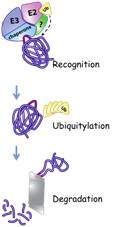- Babatz, T.D., Spear, E. D, Xu, W., Sun, O. L., Nie, L., Carpenter. E.P., and Michaelis, S. (2020) Site Specificity Determinants for Prelamin A Cleavage by the Zinc Metalloprotease ZMPSTE24. J. Biol. Chem. (In Press)
- Wood, K., Spear, E.D., Mossberg, O.W., Odinammadu, K., Xu, W., and Michaelis, S. (2020) Defining substrate requirements for cleavage of farnesylated prelamin A by the integral membrane zinc metalloprotease ZMPSTE24. PLOS ONE (In Press)
Spear, E.D, Alford, R.F., Babatz, T.D., Wood, K., Mossberg, O. Shilgardi, K., Odinammadu, K Gray, J., and Michaelis, S. (2019) A Humanized Yeast System to Analyze Cleavage of Prelamin A by ZMPSTE24. Methods 157:47-55
Preston G. M., Guerriero C. J., Metzger M.B., Michaelis S. and Brodsky J.L. 2018. Substrate insolubility dictates Hsp104-dependent endoplasmic reticulum associated degradation. Mol. Cell 70:242-253
Worman, H. J. and Michaelis, S. (2018). Permanently Farnesylated Prelamin A, Progeria and Atherosclerosis. Circulation 183:283-6 PMC6056017
Spear E. D,. Hsu E.-T., Nie L., Carpenter E.P., Hrycyna C.A., and Michaelis S. (2018). ZMPSTE24 Missense mutations that cause progeroid diseases decrease prelamin A cleavage activity and/or protein stability. Disease Models and Mechanism 11:1-12 PMID 29794150
Ast, T., Michaelis, S., Schuldiner, M. (2016) The protease Ste24 clears clogged translocons. Cell 164:103-114
Maurer, M.J., Spear, E.D., Yu, A.T., Lee, E.J., Shahzad, S, and Michaelis, S. (2016) Degradation signals for ubiquitin-proteasome dependent cytosolic protein quality control (CytoQC) in yeast. G3:Genes, Genomes, Genetics 6:1853-66, PMC4938640.
Mehmood S., Marcoux J., Gault J., Quigley A., Michaelis S., Young S.G. Carpenter, E.P. and Robinson C.V. 2016. Mass spectrometry captures off-target drug binding and provides mechanistic insights into the human metalloprotease ZMPSTE24. Nature Chem. 8:1152-1158. PMC 512 3592
Kane, M. S., Linsday, M. E., Judge, D. P., Barrowman, J., Ap Rys, C., Simonson, L., Dietz, H.C., Michaelis, S. (2013) LMNA-associated cardiocutaneous progeria: an inherited autosomal dominant premature aging syndrome with late onset. American Journal of Medical Genetics A 161:1599-1611 PMCID: PMC3740161
- Snider J., Hanif A., Lee M. E., Jin K., Yu A. R., Graham C., Chuk M., Damjanovic D., Wierzbicka M., Tang P., Balderes D., Wong V., Jessulat, M., Darowski, K.D. San Luis, BJ., Shevelev, I. Sturley S. L., Boone C., Greenblatt J. F., Zhang Z., Paumi C. M., Babu M., Park H.-O., Michaelis S., and I. Stagljar. (2013) Mapping the functional yeast ABC interactome. Nature Chem. Biol. 9:565-72 PMID: 23831759
- Michaelis, S. and Hrycyna, C.A. (2013) A protease for the ages. Science 339:1529-30. PMID: 23539586
- Barrowman, J., and Michaelis, S. (2013) The Ste24p Protease. In “Handbook of Proteolytic Enzymes,3nd Edition” (N. Rawlings, and G. S. Salvesen, eds.) Academic Press, Oxford, pp.668-676
Michaelis, S. and Hrycyna, C.A. (2013) A protease for the ages. Science 339:1529-30
Kane, M. S., Lindsay, M. E., Judge, D. P., Barrowman, J., Ap Rys, C., Simonson, L., Dietz, H.C., Michaelis, S. (2013) LMNA-associated cardiocutaneous progeria: an inherited autosomal dominant premature aging syndrome with late onset. American Journal of Medical Genetics, Part A (In Press).
Michaelis, S. and Barrowman, J. Biogenesis of the Saccharomyces cerevisiae pheromome a-factor; from yeast mating to human disease. (2012) Microbiology and Molecular Biology Reviews 76: 626-651.
Barrowman J., Wiley, P.A., Hudon, S., Hrycyna, C.A. Michaelis, S. (2012) Human ZMPSTE24 disease mutations: residual enzymatic activity correlates with disease severity. Human Molecular Genetics 21:4084-4093.
Barrowman, J., Hamblet, C., Kane M.S., Michaelis, S. (2012) Requirements for efficient proteolytic cleavage of prelamin A by ZMPSTE24. PLoS ONE 7: e32120.
Metzger MB, and Michaelis S. (2009) Analysis of Quality Control Substrates in Distinct Cellular Compartments Reveals a Unique Role for Rpn4p in Tolerating Misfolded Membrane Proteins Mol. Biol. Cell 20:1006-1019.
Barrowman, J., and Michaelis, S. (2009) ZMPSTE24, an integral membrane zinc metalloprotease with a connection to progeroid disorders. Biological Chemistry 390: 761-773.
Nakatsukasa, K., Huyer, G., Michaelis, S., and Brodsky J. L. (2008) Dissecting the ER-Associated Degradation of a Misfolded Polytopic Membrane Protein. Cell 132: 101-112
Hudon, S. E., Coffinier, C., Michaelis, S., Fong, L. G., Young, S. G., and Hrycyna, C. A. (2008) HIV-Protease inhibitors block the enzymatic activity of purified Ste24p. Biochem Biophys Res Comm. 374:365-368
Barrowman, J., Hamblet, C., George, C.M., and Michaelis, S. (2008) Analysis of prelamin A biogenesis reveals the nucleus to be a CaaX processing compartment. Mol. Biol. Cell 12:5398-5408
Metzger, M. B. Maurer, M. J., Dancy, B. M., and Michaelis, S. (2008) Degradation of a cytosolic protein requires ER-associated degradation (ERAD) machinery. J. Biol. Chem. 283:32302-32316
Paumi, C. M., Menendez, J., Arnoldo, A, Engels, K, Iyer, K. R., Thaminy, S, Georgiev, O., Barral Y., *Michaelis, S, and *Stagljar, I. (2007) Mapping Protein-Protein Interactions for the Yeast ABC Transporter Ycf1p by Integrated Split-Ubiquitin Membrane Yeast Two-Hybrid (iMYTH) Analysis. Molecular Cell 26: 15-25. * Co-corresponding senior authors.
Young, S. G. Fong, L., and Michaelis, S. (2005) Prelamin A, Zmpste24, misshapen cell nuclei, and progeria- new evidence suggesting that protein farnesylation could be important for disease pathogenesis. Journal of Lipid Research 46:2531-2558.
Mallampalli, M. P., Huyer, G., Bendale, P., Gelb, M. H., and Michaelis, S. (2005) Inhibiting Farnesylation Reverses the Nuclear Morphology Defect in a HeLa Cell Model for Hutchinson-Gilford Progeria Syndrome, Proc Natl. Acad Sci. USA 102:14416-14421.




